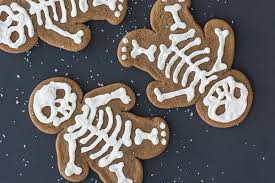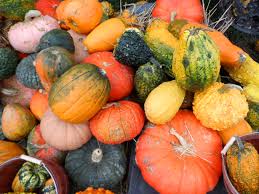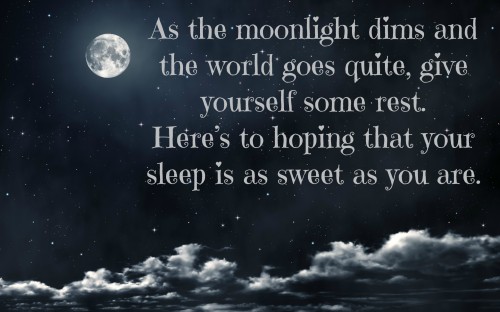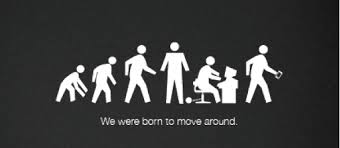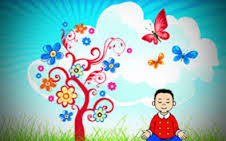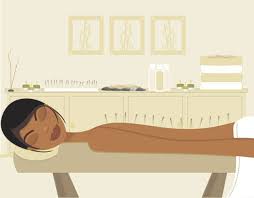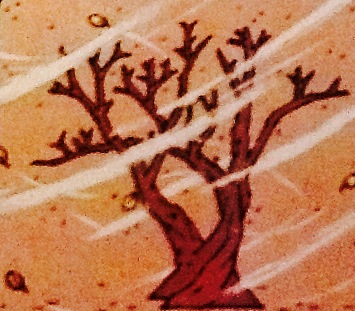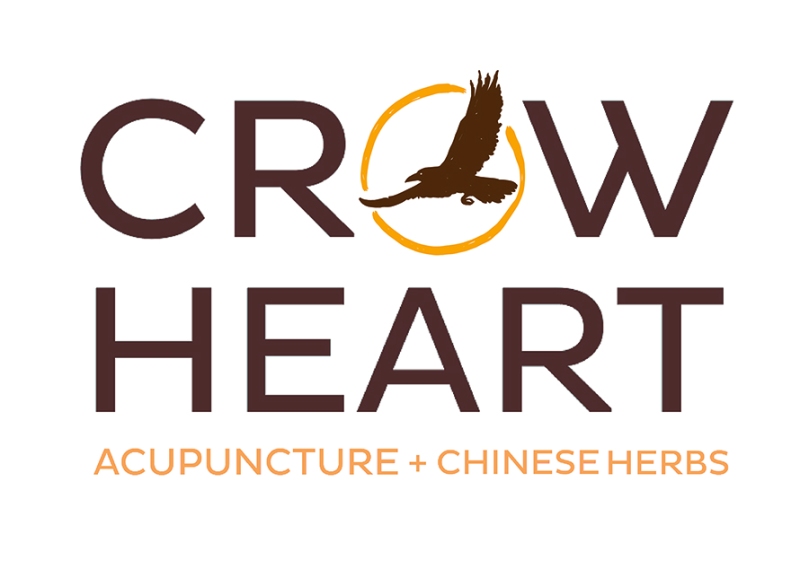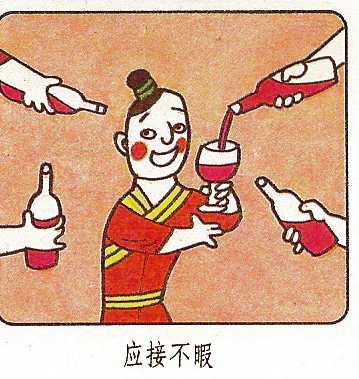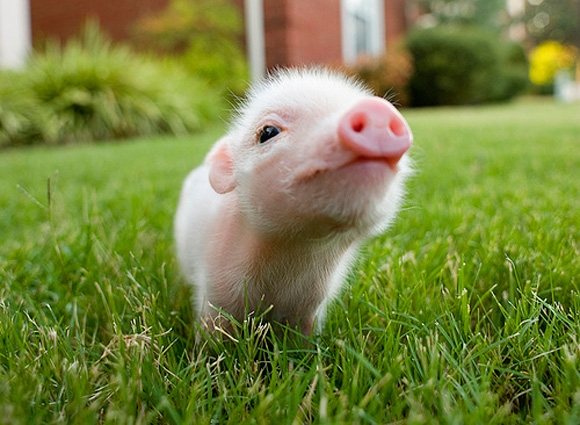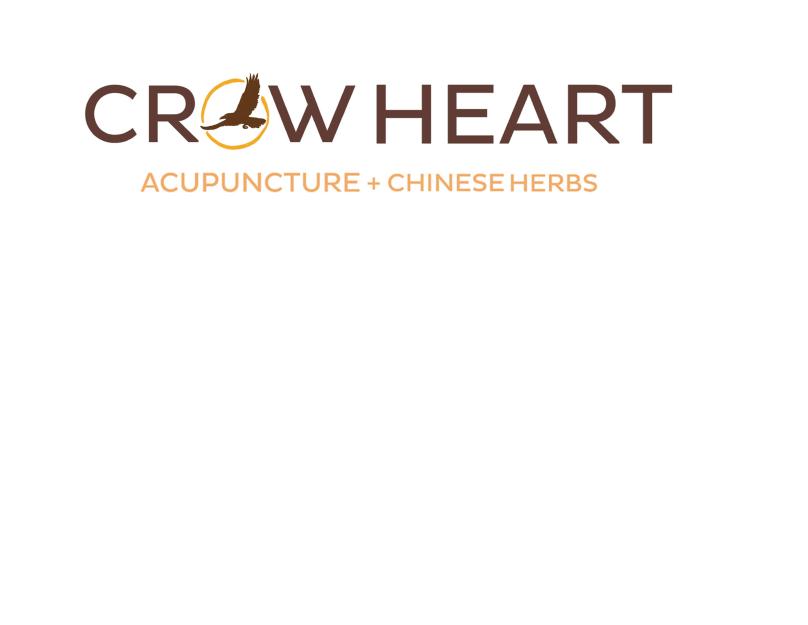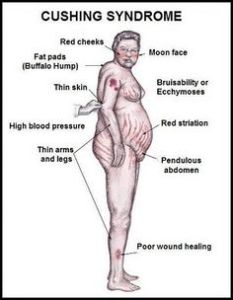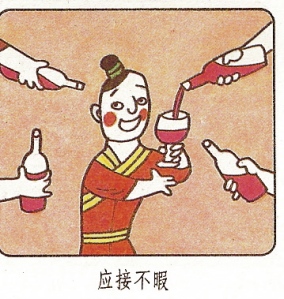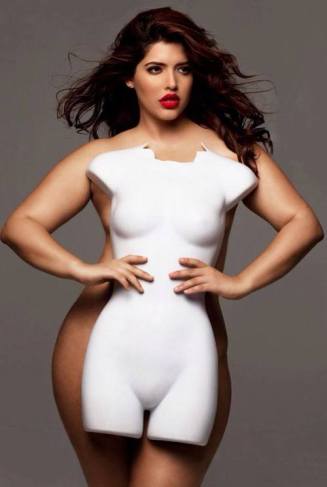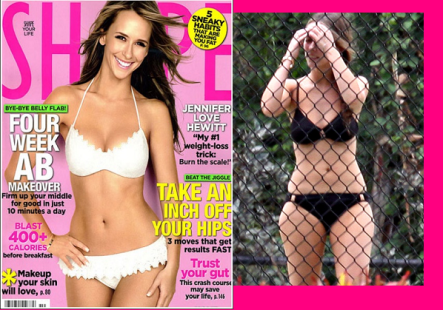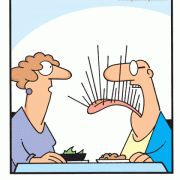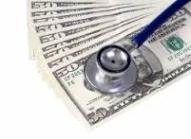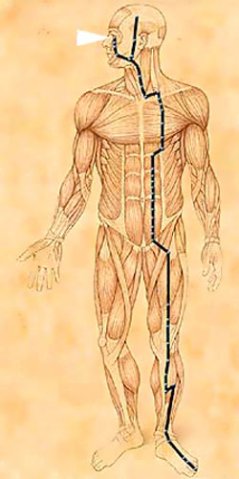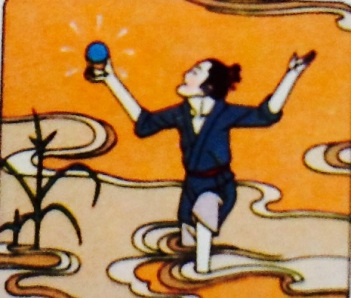At the risk of sounding completely insane, I am going to tell you the story of how I discovered the immense power of medical qi gong, that pain and disease can have an emotional root, and what I learned about being a woman. All come to you courtesy of a mysterious shoulder pain.
Taking our health for granted, and the cause of disease
When we are feeling great, we tend to take our health for granted. But break a toe, twist an ankle, or have your back go out, and suddenly it becomes apparent how wonderful it is when every body part is functioning well, and what a huge impact something seemingly so small can have on our overall wellbeing. Pain makes people grumpy! It makes the most simple task suddenly very difficult. The pain is often there for a reason. And the lessons can be life changing if we take time to listen to what it is telling us.
Aches, pains, and more serious ailments, unfortunately tend to strike when we are most stressed. Who has time to be sick? Especially when things — life — already seems overwhelming? We often have little energy to spare to take care of our own well being. But getting sick — from spraining an ankle to getting a cold — is often the body’s way of saying “slow down and pay attention!” It can be difficult to listen to these messages when life is pressing in on us. Our habit here in the Western world is to take a pill and cover up the symptoms so we can keep going, never resolving the message that lies below the illness. Sometimes the little pills stop working and we can find no relief. It is here when many people get desperate for relief, and begin trying things they would have never considered before. Like I did when my shoulder was hurting for weeks and nothing was helping.

Telling you my story may not convince you of anything. Sometimes it takes firsthand experience to discover the truth. It’s kind of like when my mom would say “Don’t make that face, it will stick!” I didn’t believe her and now I have wrinkles! Stressed out by life and working an unsatisfying desk job, I didn’t make much time for self care. But my body had lessons to teach me, and I wasn’t listening. I ended up with a mysterious shoulder pain that ultimately revealed some of the most important lessons I have ever learned.
The Mystery Pain
I don’t even know how I got the injury. I just woke up one morning with the feeling that I had a tight rubber band strangling the muscles and nerves in my left shoulder. The pain restricted my neck movements and caused my fingers to go numb. It was difficult to hold my head upright. Riding my bike — my main mode of transportation — became unbearable; sleeping was unbearable; and holding myself upright was exhausting. The pain wasn’t horrible, it was just very uncomfortable. And it stuck around. For weeks. And weeks. Any pain begins to wear on you, and it is a rare person who can continue to be cheerful while dealing with chronic pain. I was getting pretty grumpy and began to worry it would never go away. I started trying everything to get rid of it:
Ibuprofen didn’t work. A series of acupuncture treatments didn’t work. Chiropractic made it worse. Medical massage was excruciatingly painful, but helped for about a day. Saying it was a muscular problem, my primary care doctor said there was nothing she could do and referred me to acupuncture. And so the circle went. No one could help and I was getting grumpier.
It Was All Carol’s Idea
When you’ve tried every medical route you can think of, or can afford, and someone suggests something that sounds crazy, you are more likely to try it.
Carol was a woman in my physics class. She was one of those older and wiser ladies who always smiled. My physics class was taught by a very unconventional teacher. This is Berkeley after all. He arranged a field trip for us to get pictures taken of our auras.
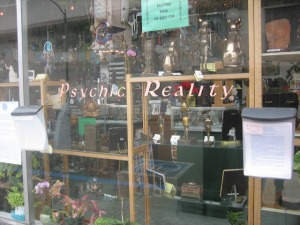 Psychic Reality in downtown Oakland
Psychic Reality in downtown Oakland
The aura photographer claims that by resting your hands on plates which measure your electromagnetic energy, he can capture your aura with instamatic film. Whatever. It was a field trip.

The place you put your hand to get your aura captured – or a prop from Lost in Space?
I brought two problems with me on that field trip. One was my shoulder pain. The other was a deeper question, a personal question I’d been mulling around, about what being a “real woman” really meant. I didn’t know it at the time, but these two problems were actually tangled up together. I have always been someone who considered herself a “human” more than a “woman.” I never put much effort into curling my hair, shopping at the mall, and painting my fingernails, and always felt a little worried that I was missing something. Approaching forty, I began to wonder if I shouldn’t maybe put some effort into this girly stuff; maybe I was missing some boat to somewhere fantastic. If I did those things, would I feel more womanly? Did I need to do those things to have a sense of personal power? What was power anyway?
 A wee bit of a tomboy
A wee bit of a tomboy
Anyway, those questions had been swimming around for some time and had popped into the forefront lately. I was in fact thinking of them as I waited on the bench with the other ladies in my class.
I was the last one in the class to get the picture of my aura taken. All my other classmates were coming out from their picture-taking session with their aura photo in hand. Their pictures were beautiful: lovely, balanced, floaty puffs of violets and yellows and oranges framing the outline of their smiling faces. There was lots of “oohing and ahhing.” There was also a lot of explaining about what the guy who took the picture said about their lovely colors. It was all good.
Finally it was my turn and I went back into the photo area and sat down. It kind of reminded me of the DMV. Just a chair and a backdrop and a camera and a guy. I placed my palms on the electromagnetic thing and the guy looked at me through his special camera. He immediately said, “Ooooh. You’re a hider.” I thought he said that too loud. “Shhh,” I said. I am a private person and he took one look at my aura and busted out with my secret. He snapped the picture and handed it over to me. It was a mess. The even fluffy cloud of color that had surrounded everyone else’s head wasn’t there. It was blobby and misshapen with a big blur of red by my right armpit. I was so embarrassed. He looked at it and said, “You’re having trouble balancing the masculine and feminine.” I told him, yes, that was true, that I didn’t really know what it meant to be a “woman.” He told me to go home and paint my fingernails, take a bubble bath, wear a fluffy pink robe, and I would find out. Huh. I thought as I clutched my shoulder in my ratty old sweat jacket. So that is what it means to be feminine?

According to him, real women take bubble baths.
I came out of the back room and didn’t want to show my aura photo to anyone. But I trusted Carol and talked to her about what he said. I also told her I had been thinking a lot lately about what it means to be a woman, and had been exploring the idea of power in relation to being a woman. I also said I did not feel totally comfortable with the photographer’s idea of femininity — nail polish, bubble baths, fluffy robes, pink. All that stuff was very foreign to me. I also told her that my shoulder hurt.

Me and my messy aura.
Carol told me to stop trying to answer this question; she said just ask the question and wait for the answers to come.That felt relieving to hear, but unlikely to produce results, I told her. She said, “It doesn’t hurt to try.” So I decided to try to follow her advice.
Carol also suggested that I try a session of Medical Qi Gong for my shoulder. I had barely heard of Medical Qi Gong and had no idea what it really was. But they taught it at my acupuncture school and they had a student clinic where you could get a treatment for twenty bucks. Carol seemed to be full of good and strange ideas, so I went home and set up an appointment to get “medical qi-gonged.”
Meanwhile my shoulder still hurt. Plus I didn’t know how to be a real woman. And my aura picture sucked.
She Flapped Her Arms Around
About a week later I showed up at my Medical Qi Gong appointment. I don’t remember the woman’s name who treated me. She was older and very motherly looking with a big skirt on. It seemed like she should be knitting. I briefly explained my issues to her and was hoping she could help — I wanted to integrate the masculine and feminine sides of myself and my shoulder hurt. It was refreshing to be able to make such a strange request to someone and be taken seriously. It was definitely something I could not have said at the doctor’s office. The older lady in the big skirt didn’t bat an eye at my request.
I still had no idea what to expect from this treatment and was curious about what would happen. Desperate for some relief from my shoulder pain, I lay back on the treatment table. I watched as she began waving her hands around over my body. She wasn’t even touching me. How was this supposed to work? A voice inside me said, “This is completely ridiculous. What am I doing here? This is stupid.” I had to close my eyes because I wanted to burst out laughing. Having grown up in Cleveland, this was the epitome of weird Berkeley new age crap, I thought.

Her flapping hands created an uncomfortable breeze.
To keep myself from laughing, I closed my eyes. All I could feel was that her flapping hands were creating a breeze on my body. Later, when I enrolled in the program to learn Medical Qi Gong, I would come to understand what she was doing. But for now it just seemed ridiculous.
After some time of waving her hands all over, she took a seat near my head and placed her hands on my left shoulder. I could feel her rocking back and forth, kind of like you would rock a baby. This, too, was a little uncomfortable. A little too intimate for my introverted self. I didn’t even know this woman. And she was touching me like I was her little baby. She rocked there, with her hands on my shoulder, for what seemed a very very long time.
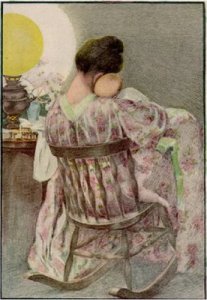
I felt like a baby.
And then things started happening while she rocked and rocked my cupped shoulder.
First came the tears. Buckets and buckets of tears. A huge release of stress and sadness tied up in that shoulder had broken loose. I was shocked at how much emotion flowed out of my tear ducts. The tears didn’t stop her or change what she doing; she just kept on rocking, and I was glad of that. It was pretty embarrassing to be reduced to a blubbering idiot in front of this stranger. Why was I crying?
And then came the realization of what was behind those tears.
The Horrifying Stories
It was the newspaper. During the weeks before my shoulder went bad there were three awful stories in the news that had caught my attention. They all had a similar theme. And one by one, as the lady in the skirt rocked my shoulder, the stories came up in my mind. The first was a particularly awful story of a gang rape of a local high school student at her prom. I felt anger begin to mix in with my tears. The second was the story of an Austrian man who had locked his daughter up in a secret basement chamber for over a decade and fathered seven children with her — children who had never seen the light of day until their dungeon was discovered. I felt my anger increase as I recalled this horrifying story.

He did horrible things.
And the third was a story about a gunman who came into a church in Tennessee during a performance given by the children of the congregation. The gunman had aimed to kill those children, but a brave parishioner leapt up to protect those kids with his own body and was shot dead instead, preventing the gunman from killing those kids. The lady in the skirt continued to rock me, and my shoulder pain increased as I recalled these stories. I felt anger’s tight grip in my heart. It started to become clear to me why my shoulder had been hurting. I was mad. I didn’t know what to do those feelings. They found a place in my shoulder, and were waiting there for me to address them.
The woman stopped rocking my shoulder. I still had my eyes closed but it felt like she had positioned herself at the other end of the table. I somehow felt her palms near the bottom of my feet. She wasn’t touching me but I could sense her there.

An Experience That is Hard to Describe
Next was an experience that words simply cannot describe, but words are all I have to explain it.
The anger began to melt away. At first it was just like a warm glow surrounding the entire surface of my body — a very pleasant, comforting feeling. Soon, it was as though my body was made of a bright white light and I had been plugged into a power strip that connected me to the universe. It was a power so strong that I couldn’t have imagined it; a power so strong I cannot do it justice in words. It was simply amazing. Imagine your body being made of nothing but the most benevolent ray of light. All kindness and love, but with a strength that can move mountains. I wanted to ask what was happening; it was a feeling that I imagine people have during near death experiences when they go toward the light and don’t want to return.

It really did feel like this.
The plugged in feeling shifted and I saw a large cave; it was dark and cold and wet. Inside the cave arose a huge snake. A cobra. It took my breath away. It was a very powerful force. An answer appeared: “This is the Divine Feminine.” She was powerful and righteous. She was not wearing a pink robe. She was not in a bubble bath. She did not have her fingernails polished. She was pure power and righteousness — willing to do whatever was needed to protect others. I wondered: “Why is the divine feminine a snake?” It surprised me, as I always had thought of snakes as a phallic symbol representing men. It didn’t make any sense to me. But there she was. And I finally understood the *real* power of the feminine. It is awesome. A strength and compassion beyond which I could ever had imagined. I had no idea.

(When I got home I looked up snake symbolism and read that “practically every culture has a snake in its mythology, and most often it is seen as a symbol of wisdom, healing, initiation, and secret knowledge, or it is associated with eternal life and ongoing renewal. Snake is the archetypal symbol of the Great Mother Goddess, incarnate in one of her most universal forms…a symbol of the Kundalini Shakti energy, the cosmic feminine energy that ignites and fuels our spiritual awakening process…in which positive and negative, male and female, consciousness and unconsciousness are intermingled…”) Oh.

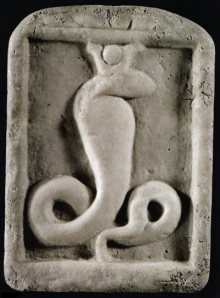
Many cultures have stories about a powerful serpent Goddess. I had no idea.
The rocking had stopped. The hand waving was over. My time was up. I opened my eyes. The woman who treated me looked kind of blank and innocent. She asked quietly, “Would you like to give any feedback?”
Holy shit. Feedback! I had just experienced the most intense half hour of my life. I understood where my shoulder pain originated. I understood how power and femininity belonged together. I understood how anger can get stuck in my body and make me sick. Still sobbing, I blurted out the whole experience to her, kind of surprised she didn’t already know what had happened as she had been there with me the whole time, rocking me like a baby. She seemed a bit startled by all this information, but pleased to have helped. I was floored by the whole experience. I walked out of there prouder than ever to be a woman, now that I understood what a gift it is. Women are strong. There is nothing to be ashamed of. It is our place to help stop all this violence. We need to speak up. And we don’t need painted nails and bubble baths to do (though this last year, I have discovered the power of a bubble bath).
All that had happened, but my shoulder still hurt. However, within a week the problem dissolved. I hardly noticed. It just went away.
It Gets Weirder
This story gets weirder, if that’s possible. The day after the Medical Qi Gong experience I went to work at my desk job. A co-worker came into my office in the morning with a card. She was asking all of us to sign this card for Brian’s dad. Brian was a new guy at work. I asked, “What happened to Brian’s dad?” Well, she explained, he was at church in Tennessee when a gunman burst in to kill the children on stage. Brian’s dad leapt from the audience to protect those children on stage and was shot to death.
Unfortunately, all I could think to say was “Holy crap.” I was stunned.
The next semester at school I decided to enroll in the Medical Qi Gong program.

Absolutely impressed by my experience, I completed the Medical Qi Gong training.
In the six years that I have been practicing Medical Qi Gong I have had some extraordinary experiences and have seen time and again the emotional root of patients’ diseases. Sometimes the realization comes from something they experience while on the table, and sometimes it comes from something I “see” in them (while waving my hands around and touching them on the shoulder!). I tend to reserve this method of treatment for cases when nothing else seems to help and the acupuncture treatments aren’t getting their usual effect. Once the root of the disease is revealed, the problem often resolves itself quickly.
The Seven Emotions in Chinese Medicine
In Chinese Medicine there is a list of the causes of disease that we are taught over and over again. Prominently featured in this list are the “seven emotions.” The Eastern medical system has understood this for a long time — stuck emotions can cause disease and disease can lead to stuck emotions. In a Chinese medical text written over 2,000 years ago, it is said that there are seven emotions that can impair organ systems in the body (the emotions are: anger, worry, grief, fear, anxiety, fright, and joy/mania). We are trained in detecting how these emotions affect the organ systems, and how rebalancing energy through acupuncture, herbal medicine, and qi gong can help release or resolve these emotions. It is also written by the sages that emotions are to be felt, but then let go of. It is the holding of the emotion that can make someone sick.

The yin organs have both positive and negative emotions associated with them, depending on their state of health.
Western Biomedical Research on Emotions as a Cause of Disease
In the West, scientists have recently been exploring this idea as well – the impact of emotions on health – and certain pockets of the medical community are beginning to “prove” this ancient Eastern idea to be true.

Even in the West, we admit emotions can cause disease!
Harvard School of Public Health has published several studies on this topic. They note:
“A vast scientific literature has detailed how negative emotions harm the body. Serious, sustained stress or fear can alter biological systems in a way that, over time, adds up to ‘wear and tear’ and, eventually, illnesses such as heart disease, stroke, and diabetes. Chronic anger and anxiety can disrupt cardiac function by changing the heart’s electrical stability, hastening atherosclerosis, and increasing systemic inflammation.”
Harvard researcher Jack Shonkoff explains that “early childhood ‘toxic stress’ —the sustained activation of the body’s stress response system resulting from such early life experiences as chronic neglect, exposure to violence, or living alone with a parent suffering severe mental illness—has harmful effects on the brain and other organ systems. Among these effects is a hair-trigger physiological response to stress, which can lead to a faster heart rate, higher blood pressure, and a jump in stress hormones.”
Another Harvard researcher, Laura Kubzansky, has been studying the impact of emotions on health. She states that, “It looks like there is a benefit of positive mental health that goes beyond the fact that you’re not depressed. What that is is still a mystery. But when we understand the set of processes involved, we will have much more insight into how health works.” Some results from her studies conclude that:
- Optimism cuts the risk of coronary heart disease by half.
- Children who are able to stay focused on a task and have a more positive outlook at age 7 report better general health and fewer illnesses 30 years later.
- Participants who reported fewer social ties at the beginning of the survey were more than twice as likely to die over the nine-year follow-up period, an effect unrelated to behaviors such as smoking, drinking, and physical activity. Social ties included marriage, contact with friends and relatives, organizational and church membership.
- Kubzansky concedes that psychological states such as anxiety or depression—or happiness and optimism—are forged by both nature and nurture. “They are 40–50 percent heritable, which means you may be born with the genetic predisposition. But this also suggests there is a lot of room to maneuver.”
- Kubzansky states, “My guess is that many of the people who are chronically distressed never figured out how to come back from a bad experience, focus on something different, or change their perspective.” And, “Everyone needs to find a way to be in the moment,” she says, “to find a restorative state that allows them to put down their burdens.”
In the 1990s the Federal Center for Disease Control studied over 17,000 patients of a large health plan to assess the link between emotional experience and adult health. Some of their findings:
- Those who had experienced an adverse childhood experience [abuse or neglect] were between 4 and 50 times more likely to have an adverse health condition or disease as an adult. The adverse health outcomes covered a surprisingly wide range, including heart disease, fractures, diabetes, obesity, alcoholism, and more.
- Emotional vitality and emotional balance appear to reduce the risk of coronary artery disease. The protective effect was distinct and measurable, even when taking into account such wholesome behaviors as not smoking and regular exercise.
- A summary of the research goes so far as to say “State of Mind = State of Body.”
- “The truth is that all emotional experience affects our health, whether positive or negative, and whether it occurs in the past or the present. But negative experiences appear to have more lasting health effects, perhaps because we don’t deal with them.”
- The Center for Disease Control estimates that 90% of all visits to the doctor are stress-related, and there are hundreds of medical studies linking stress to a host of diseases.
Managing Emotions
Traditional Chinese Medicine — acupuncture, herbs, medical qi gong, etc. — is just one treatment modality that can help someone to transform unhealthy emotional states and rebalance the body. Combined with good lifestyle habits, regular exercise, connections to your community, family, friends, as well as healthy eating, and therapy from a licensed psychotherapist, you may find well being like you’ve never known it before.
Links to Learn More
Western research into the Biology of Emotions:
http://www.hsph.harvard.edu/news/magazine/happiness-stress-heart-disease/
http://psychcentral.com/lib/unraveling-the-biology-of-emotions/000728
https://www.nlm.nih.gov/exhibition/emotions/frontiers.html
http://www.enlightenedfeelings.com/body.html
http://www.womentowomen.com/emotions-anxiety-mood/how-emotional-experience-determines-your-health/
Chinese Medicine and Emotions:
http://www.sacredlotus.com/theory/illness/seven_emotions.cfm
http://www.chinesemedicineliving.com/blog/philosophy/the-emotions/
Medical Qi Gong:
http://www.scn.org/acu/medical_qi_gong.html
http://www.qigongmedicine.com/

Please visit our website for more information
http://crowheartacupuncture.wix.com/crowheart
Reach us by email or phone to schedule an appointment or receive a free 15 minute phone consultation.
crowheartacupuncture@gmail.com
510.919.5689
